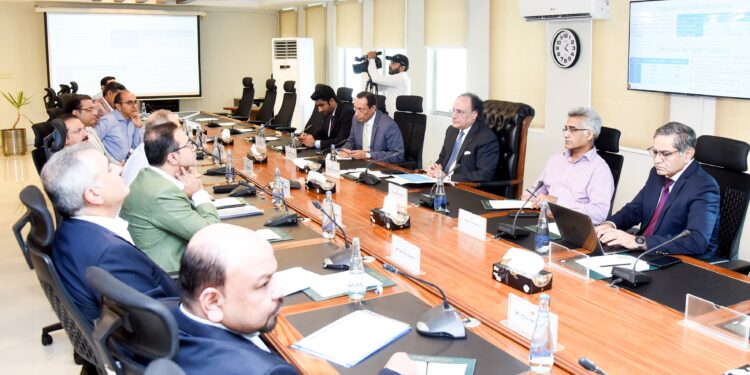ISLAMABAD: Federal Minister for Finance and Revenue, Senator Muhammad Aurangzeb, held a meeting on Thursday with a delegation of the country’s leading textile and garments producers and exporters, led by Shahzad Saleem of Nishat Chunian Ltd and comprising Aamir Fayyaz of Kohinoor Mills, Amer Abdullah of Sapphire Group, Shahzad Ahmad of Arshad Corporation, Rehman Naseem of Fazal Cloth, Khurram Mukhtar of Sadaqat Textiles, and Anees Khawaja of Mahmood Group. Senior officers from the Finance Division and the Federal Board of Revenue (FBR) were also present.
The delegation shared their perspectives on the current state of the textile sector and its future outlook, emphasizing both the opportunities for further enhancing Pakistan’s export competitiveness and the challenges that need to be addressed to sustain growth momentum.
Senator Muhammad Aurangzeb acknowledged the vital role of the textile industry as the backbone of Pakistan’s export base and a key contributor to employment and industrial development. He underlined the government’s commitment to strengthening this sector by providing an enabling environment that supports growth, competitiveness, and resilience in the face of global market dynamics.
The Minister reaffirmed that the government is pursuing comprehensive reforms aimed at reducing structural bottlenecks, rationalizing the tax framework, and ensuring greater policy continuity. He highlighted that broadening the tax base, rationalizing expenditures, and aligning fiscal measures with industrial priorities are central to the government’s economic reform agenda.
He further noted that the forthcoming industrial policy would reflect market realities and industry expectations, ensuring that the concerns of key sectors are addressed in a timely and effective manner. He added that the relocation of the Tax Policy Office to the Finance Division will help strengthen policy design and continuity, with a sharper focus on supporting industrial growth and export expansion.
Senator Aurangzeb assured the delegation of continued engagement and regular interaction, stressing the importance of a structured feedback mechanism between the government and industry stakeholders. He emphasized that the government remains committed to consultative decision-making and a whole-of-government approach in advancing the country’s economic and export objectives.
Wrapping up the meeting, the Finance Minister reaffirmed that the textile sector will remain a central pillar of Pakistan’s future economic strategy, with its growth and competitiveness being treated as a top priority in the broader agenda of reforms and sustainable development based on investment and export-led growth.
CCP approves Toyota led integration of Hino and Mitsubishi Fuso operations
ISLAMABAD, Jan 15: The Competition Commission of Pakistan (CCP) has approved two interconnected merger transactions that are part of a...
Read more














